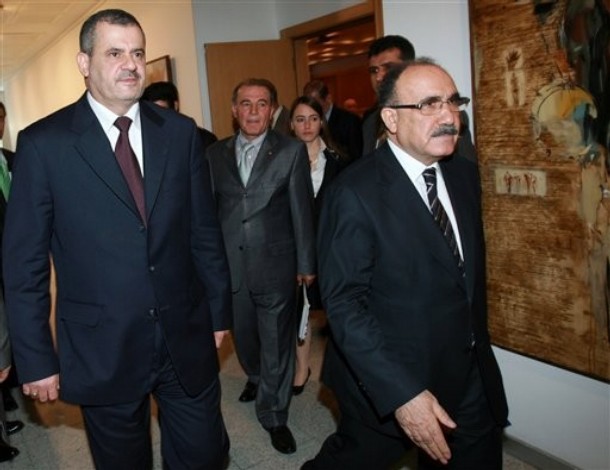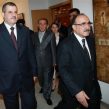
Ankara Hosts Trilateral Talks on the Kurdish Question
Publication: Eurasia Daily Monitor Volume: 6 Issue: 145
By:

Delegations led by the Turkish Interior Minister Besir Atalay, Iraqi Minister of State for National Security Shirwan al-Waili and U.S. Major-General Steven A. Hummer, the deputy chief of staff for operations in Iraq’s multinational force met in Ankara for trilateral talks to discuss how to address the Kurdistan Workers’ Party (PKK), which uses northern Iraqi territory as a base to organize attacks inside Turkey. The trilateral meetings were originally initiated in 2007 and since then the three parties have met to make coordinated action against the PKK more effective. Previous meetings were held in November 2008 in Baghdad and discussed the basis for possible action plans after the U.S. withdrawal from Iraq (EDM, November 20, 2008).
On this occasion the parties discussed specific action plans against the PKK. Atalay said after the meeting that Turkey wants more solid results from these talks (Yeni Safak, July 29). The Iraqi side acknowledged that the PKK undermines Turkish-Iraqi relations and wants to cooperate with Turkey. "Our aim is to remove the terrorist organization from Iraqi soil and border areas," al-Waili told a joint press conference with Atalay (Today’s Zaman, July 29). Reportedly, the Mahmur refugee camp was one of the main topics on the agenda (Taraf, July 29). The Mahmur refugee camp, led by U.N., was established in northern Iraq in 1992 by Turkish Kurds fleeing from fighting inside Turkey between the PKK and Turkish security forces.
Since 1992 Turkey has repeatedly called on the camp to be closed, claiming that it harbored PKK fighters and was a base for spreading separatist propaganda, as well as providing a recruitment pool for the PKK (German Press Agency, January 17, 2007). Atalay avoided repeating this position, and stated: "We need more information and analysis about the camp. We have also discussed these issues at this meeting" (Yeni Safak, July 29). This shift in rhetoric might indicate Turkey’s plan to use the Mahmur camp as a station to gather the PKK militants as part of the government’s peace plan. Recently, the Turkish press reported that the camp will be used as a rehabilitation station for PKK militants to reintegrate them into society after Turkey’s comprehensive plan is introduced in early August (Sabah, July 26). Kurdistan Democratic Party (KDB)’s representative for foreign affairs confirmed that "the PKK militants who lay down their arms and do not break the law in northern Iraq could live in the Mahmur camp as ‘a citizen.’ Yet the main issue is to deal with how and under what conditions 4,000 to 5,000 PKK militants would want to lay down their arms" (Referans, July 26).
On July 23 Prime Minister Recep Tayyip Erdogan revealed that the Justice and Development Party (AKP) government has launched a comprehensive plan to address the Kurdish question (EDM, July 24). Atalay said that he will disclose the governments’ plan publicly on July 29. It is expected that the government plan will include a "two-tier process" with "multiple options." "We are discussing matters that no one had the courage to mention a short while ago," a senior civil servant involved with the preparations said (Hurriyet Daily News, July 22). The timing of the trilateral talks therefore coincided with these developments.
It was claimed that the plan is supported by both the United States and the Iraqi governments. The proposals might include the publication of Kurdish literature by the culture ministry; elective Kurdish-language classes in schools; the broadening of Kurdish broadcasts to private television channels; a Kurdish-language version of the Koran; Kurdish sermons in mosques and the distribution of Kurdish religious books by the religious affairs directorate. Measures to facilitate the break-up of the PKK will be included along with those to expand the cultural rights of the Kurds. The plan does not include a pardon for Ocalan, though there have been discussions about how effective any amnesty could be if it does not involve senior members of the PKK (Radikal, Hurriyet Daily News, July 22).
Apparently linked with this plan the Turkish National Police Academy is hosting a panel to discuss the Kurdish question. It is the first time that a Turkish governmental institution will openly discuss the Kurdish question in this format. It is expected that Atalay, the head of the National Intelligence Agency (MIT), Emre Taner, and the Director of the Turkish National Police Oguz Kagan Koksal along with leading academics and journalists will be participating in the panel (Radikal, July 29).
These developments indicate that the AKP government is cooperating with Turkey’s allies including the U.S., E.U. and Iraq in order to address the long-standing Kurdish question. For its part, Ankara is taking radical steps to grant more cultural and political rights to its Kurdish minorities. However, the success of the plan remains unknown, due to the rapidly changing geopolitical dynamics in the region.




